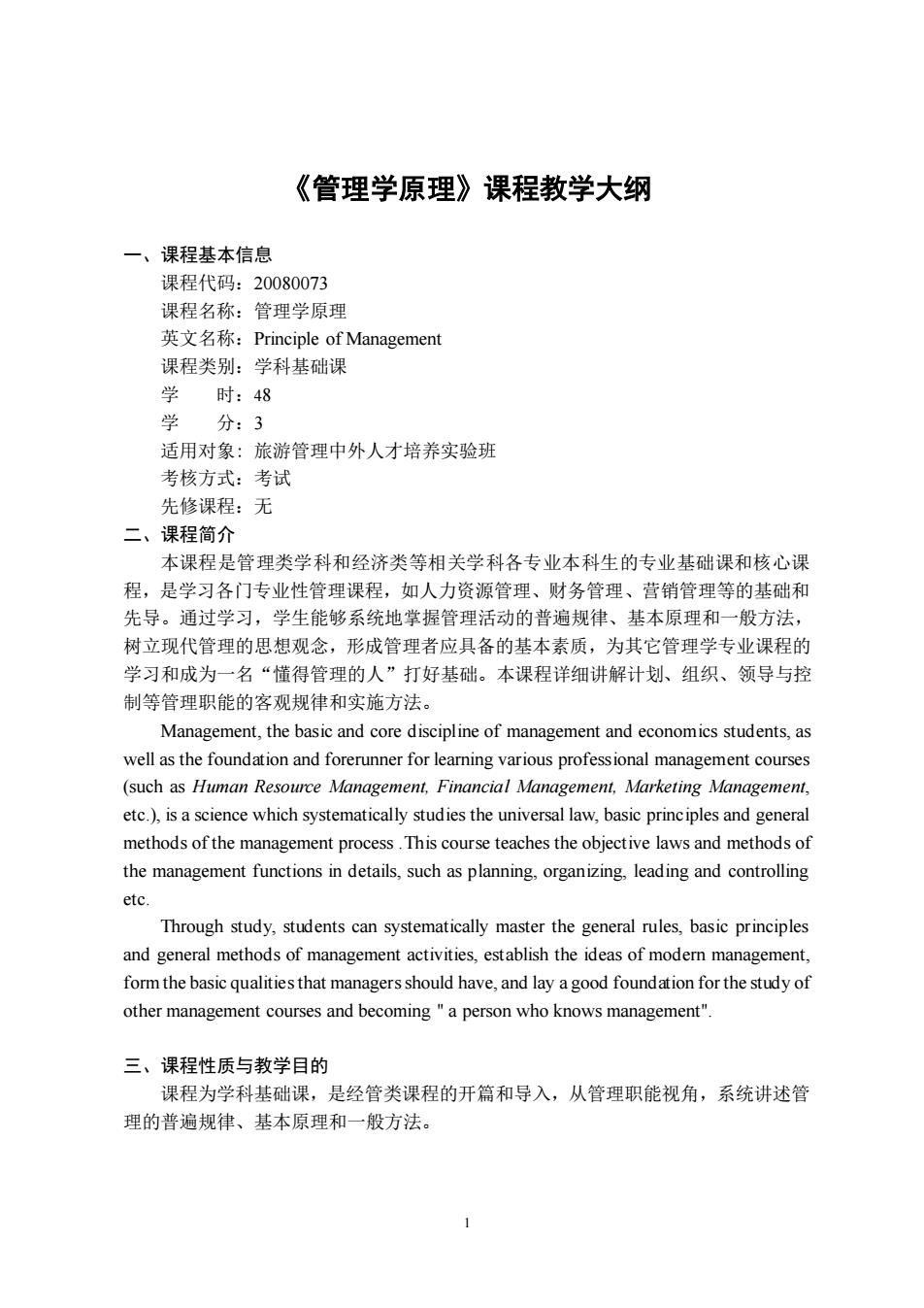
《管理学原理》课程教学大纲 一、课程基本信息 课程代码:20080073 课程名称:管理学原理 英文名称:Principle of Management 课程类别:学科基础课 时:48 学 分:3 适用对象:旅游管理中外人才培养实验班 考核方式:考试 先修课程:无 二、课程简介 本课程是管理类学科和经济类等相关学科各专业本科生的专业基础课和核心课 程,是学习各门专业性管理课程,如人力资源管理、财务管理、营销管理等的基础和 先导。通过学习,学生能够系统地掌握管理活动的普遍规律、基本原理和一般方法, 树立现代管理的思想观念,形成管理者应具备的基本素质,为其它管理学专业课程的 学习和成为一名“懂得管理的人”打好基础。本课程详细讲解计划、组织、领导与控 制等管理职能的客观规律和实施方法。 Management,the basic and core discipline of management and economics students,as well as the foundation and forerunner for leaming various professional management courses (such as Human Resource Management,Financial Management,Marketing Management, etc.),isa science which systematically studies the universal law,basic principles and general methods of the management process.This course teaches the objective laws and methods of the management functions in details,such as planning.organizing,leading and controlling etc. Through study,students can systematically master the general rules,basic principles and general methods of management activities,establish the ideas of modern management, form the basic qualities that managers should have,and lay a good foundation for the study of other management courses and becoming a person who knows management" 三、课程性质与教学目的 课程为学科基础课,是经管类课程的开篇和导入,从管理职能视角,系统讲述管 理的普遍规律、基本原理和一般方法
1 《管理学原理》课程教学大纲 一、课程基本信息 课程代码:20080073 课程名称:管理学原理 英文名称:Principle of Management 课程类别:学科基础课 学 时:48 学 分:3 适用对象: 旅游管理中外人才培养实验班 考核方式:考试 先修课程:无 二、课程简介 本课程是管理类学科和经济类等相关学科各专业本科生的专业基础课和核心课 程,是学习各门专业性管理课程,如人力资源管理、财务管理、营销管理等的基础和 先导。通过学习,学生能够系统地掌握管理活动的普遍规律、基本原理和一般方法, 树立现代管理的思想观念,形成管理者应具备的基本素质,为其它管理学专业课程的 学习和成为一名“懂得管理的人”打好基础。本课程详细讲解计划、组织、领导与控 制等管理职能的客观规律和实施方法。 Management, the basic and core discipline of management and economics students, as well as the foundation and forerunner for learning various professional management courses (such as Human Resource Management, Financial Management, Marketing Management, etc.), is a science which systematically studies the universal law, basic principles and general methods of the management process .This course teaches the objective laws and methods of the management functions in details, such as planning, organizing, leading and controlling etc. Through study, students can systematically master the general rules, basic principles and general methods of management activities, establish the ideas of modern management, form the basic qualities that managers should have, and lay a good foundation for the study of other management courses and becoming " a person who knows management". 三、课程性质与教学目的 课程为学科基础课,是经管类课程的开篇和导入,从管理职能视角,系统讲述管 理的普遍规律、基本原理和一般方法
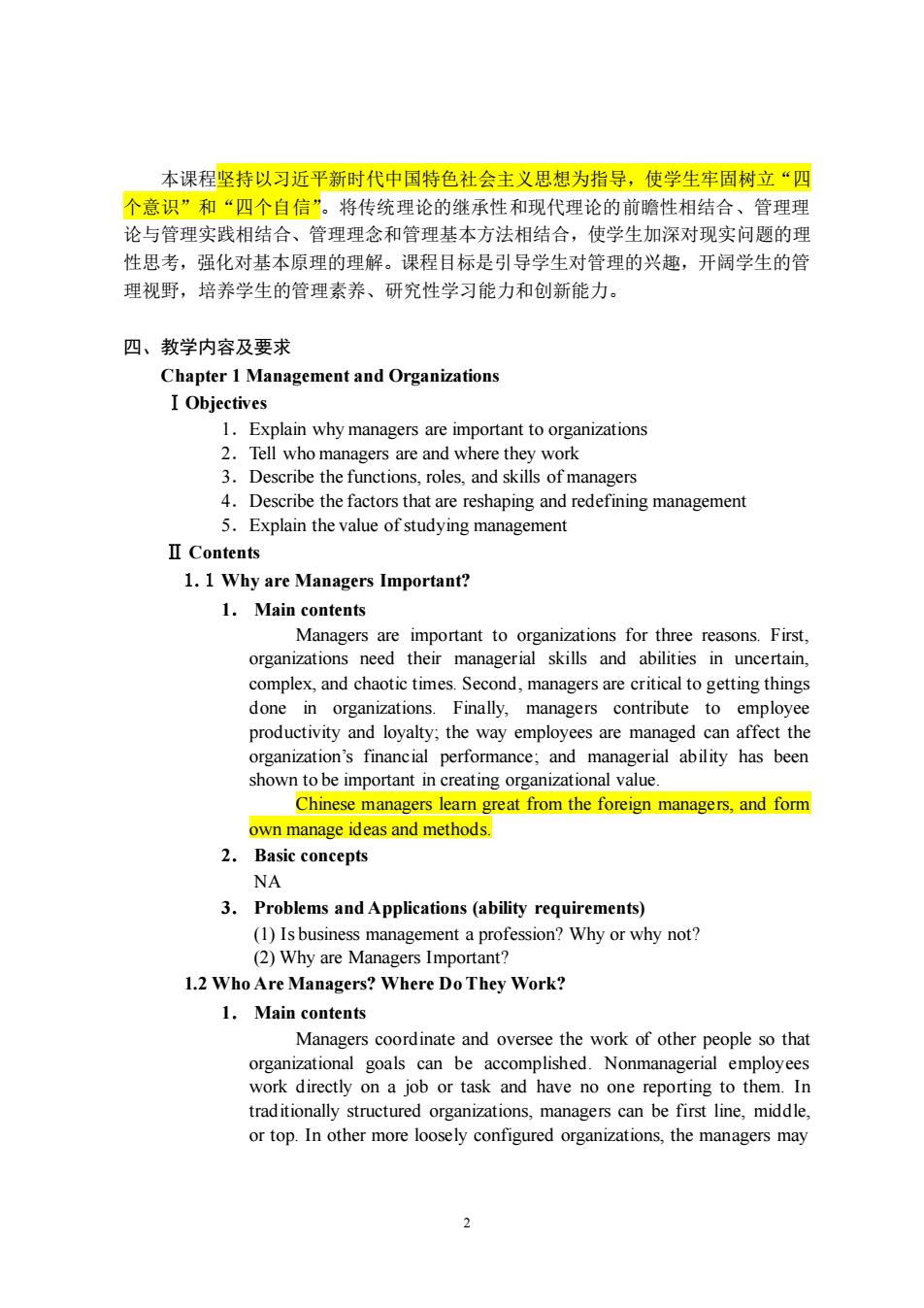
本课程坚持以习近平新时代中国特色社会主义思想为指导,使学生牢固树立“四 个意识”和“四个自信”。将传统理论的继承性和现代理论的前瞻性相结合、管理理 论与管理实践相结合、管理理念和管理基本方法相结合,使学生加深对现实问题的理 性思考,强化对基本原理的理解。课程目标是引导学生对管理的兴趣,开阔学生的管 理视野,培养学生的管理素养、研究性学习能力和创新能力。 四、教学内容及要求 Chapter 1 Management and Organizations I Obiectives 1.Explain why managers are important to organizations 2. Tell who managers are and where they work 3.Describe the functions.roles.and skills of managers 4.Describe the factors that are reshaping and redefining management 5.Explain the value of studying management II Contents 1.1 Why are managers Important? 1.Main contents Managers are important to organizations for three reasons.First organizations need their managerial skills and abilities in uncertain, complex,and chaotic time nd,managers are critical to getting thing done in organizations.Finally,managers contribute to employee productivity and loyalty;the way employees are managed can affect the organization's financial performance;and managerial ability has been shown to be important in creating organizational value. Chinese anagers lear at from the foreign managers,and form own manage ideas and methods 2.Basic concepts NA 3.Problems and Applications(ability requirements) (1)Is business management a profession?Why or why not? (2)Why are Managers Important? 1.2 Who Are Managers?Where Do They Work? 1.Main contents Managers coordinate and oversee the work of other people so that organizational goals can be accomplished.Nonmanagerial employees work directly on a job or task and have no one reporting to them.In traditionally structured organizations,managers can be first line,middle, or top.In other more loosely configured organizations,the managers may 2
2 本课程坚持以习近平新时代中国特色社会主义思想为指导,使学生牢固树立“四 个意识”和“四个自信”。将传统理论的继承性和现代理论的前瞻性相结合、管理理 论与管理实践相结合、管理理念和管理基本方法相结合,使学生加深对现实问题的理 性思考,强化对基本原理的理解。课程目标是引导学生对管理的兴趣,开阔学生的管 理视野,培养学生的管理素养、研究性学习能力和创新能力。 四、教学内容及要求 Chapter 1 Management and Organizations ⅠObjectives 1.Explain why managers are important to organizations 2.Tell who managers are and where they work 3.Describe the functions, roles, and skills of managers 4.Describe the factors that are reshaping and redefining management 5.Explain the value of studying management Ⅱ Contents 1.1 Why are Managers Important? 1. Main contents Managers are important to organizations for three reasons. First, organizations need their managerial skills and abilities in uncertain, complex, and chaotic times. Second, managers are critical to getting things done in organizations. Finally, managers contribute to employee productivity and loyalty; the way employees are managed can affect the organization’s financial performance; and managerial ability has been shown to be important in creating organizational value. Chinese managers learn great from the foreign managers, and form own manage ideas and methods. 2. Basic concepts NA 3. Problems and Applications (ability requirements) (1) Is business management a profession? Why or why not? (2) Why are Managers Important? 1.2 Who Are Managers? Where Do They Work? 1. Main contents Managers coordinate and oversee the work of other people so that organizational goals can be accomplished. Nonmanagerial employees work directly on a job or task and have no one reporting to them. In traditionally structured organizations, managers can be first line, middle, or top. In other more loosely configured organizations, the managers may
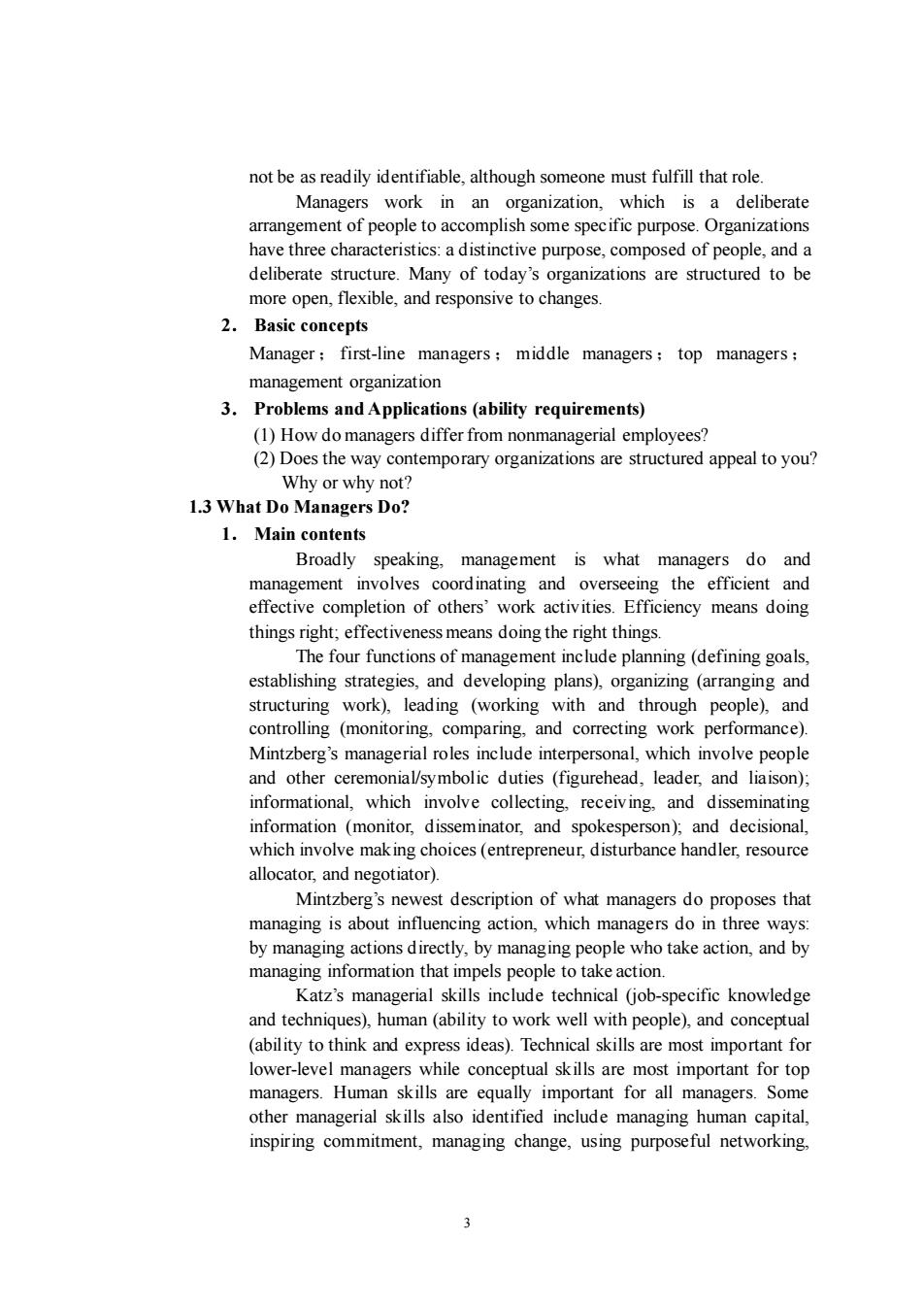
not be as readily identifiable.although someone must fulfill that role Managers work in an organization which is a deliberate e three characteristics adis inctive purpos d of people ,and deliberate structure. Many of today's organizations are structured to be more open,flexible,and responsive to changes. 2.Basic concepts Manager:first-line managers middle managers top managers management organization 3.Problems and Applications(ability requirements) (1)How do managers differ from nonmanagerial emplovees? (2)Does the way contemporary organizations are structured appeal to you? or why no 1.3 What Do Managers Do 1.Main contents Broadly speaking. nagement is what ma management nvolves co rd inating and oversee effective completion of others'work activities.Efficiency means doing things right:effectiveness means doing the right things The four functions of management include planning(defining goals establishing strategies,and develop ing plans),or g (arrang and ing wor leading (working and throu people), controlling (monitoring,comparing,and correcting work performance) Mintzberg's managerial roles include interpersonal,which involve people and other ceremonial/symbolic duties (figurehead,leader,and liaison); informational,which involve collecting,receiving,and disseminating ( onitor. s and esperso and decision oices(entrepreneur,disturbance handler,resource allocator.and negotiator). Mintzberg's newest description of what managers do proposes that managing is about influencing action,which managers do in three ways: by ma actions dire ly,by anaging pe ho take action and by managing information that i eople Katz's managerial skills include technical (job-specific knowledge and techniques),human (ability to work well with people),and conceptual (ability to think and express ideas).Technical skills are most important for lower-level mand while con ptual skills are most ir portant for top nagers.Hu e equa important for all other managing human inspiring commitment,managing change,using purposeful networking, 3
3 not be as readily identifiable, although someone must fulfill that role. Managers work in an organization, which is a deliberate arrangement of people to accomplish some specific purpose. Organizations have three characteristics: a distinctive purpose, composed of people, and a deliberate structure. Many of today’s organizations are structured to be more open, flexible, and responsive to changes. 2. Basic concepts Manager ; first-line managers ; middle managers ; top managers ; management organization 3. Problems and Applications (ability requirements) (1) How do managers differ from nonmanagerial employees? (2) Does the way contemporary organizations are structured appeal to you? Why or why not? 1.3 What Do Managers Do? 1. Main contents Broadly speaking, management is what managers do and management involves coordinating and overseeing the efficient and effective completion of others’ work activities. Efficiency means doing things right; effectiveness means doing the right things. The four functions of management include planning (defining goals, establishing strategies, and developing plans), organizing (arranging and structuring work), leading (working with and through people), and controlling (monitoring, comparing, and correcting work performance). Mintzberg’s managerial roles include interpersonal, which involve people and other ceremonial/symbolic duties (figurehead, leader, and liaison); informational, which involve collecting, receiving, and disseminating information (monitor, disseminator, and spokesperson); and decisional, which involve making choices (entrepreneur, disturbance handler, resource allocator, and negotiator). Mintzberg’s newest description of what managers do proposes that managing is about influencing action, which managers do in three ways: by managing actions directly, by managing people who take action, and by managing information that impels people to take action. Katz’s managerial skills include technical (job-specific knowledge and techniques), human (ability to work well with people), and conceptual (ability to think and express ideas). Technical skills are most important for lower-level managers while conceptual skills are most important for top managers. Human skills are equally important for all managers. Some other managerial skills also identified include managing human capital, inspiring commitment, managing change, using purposeful networking
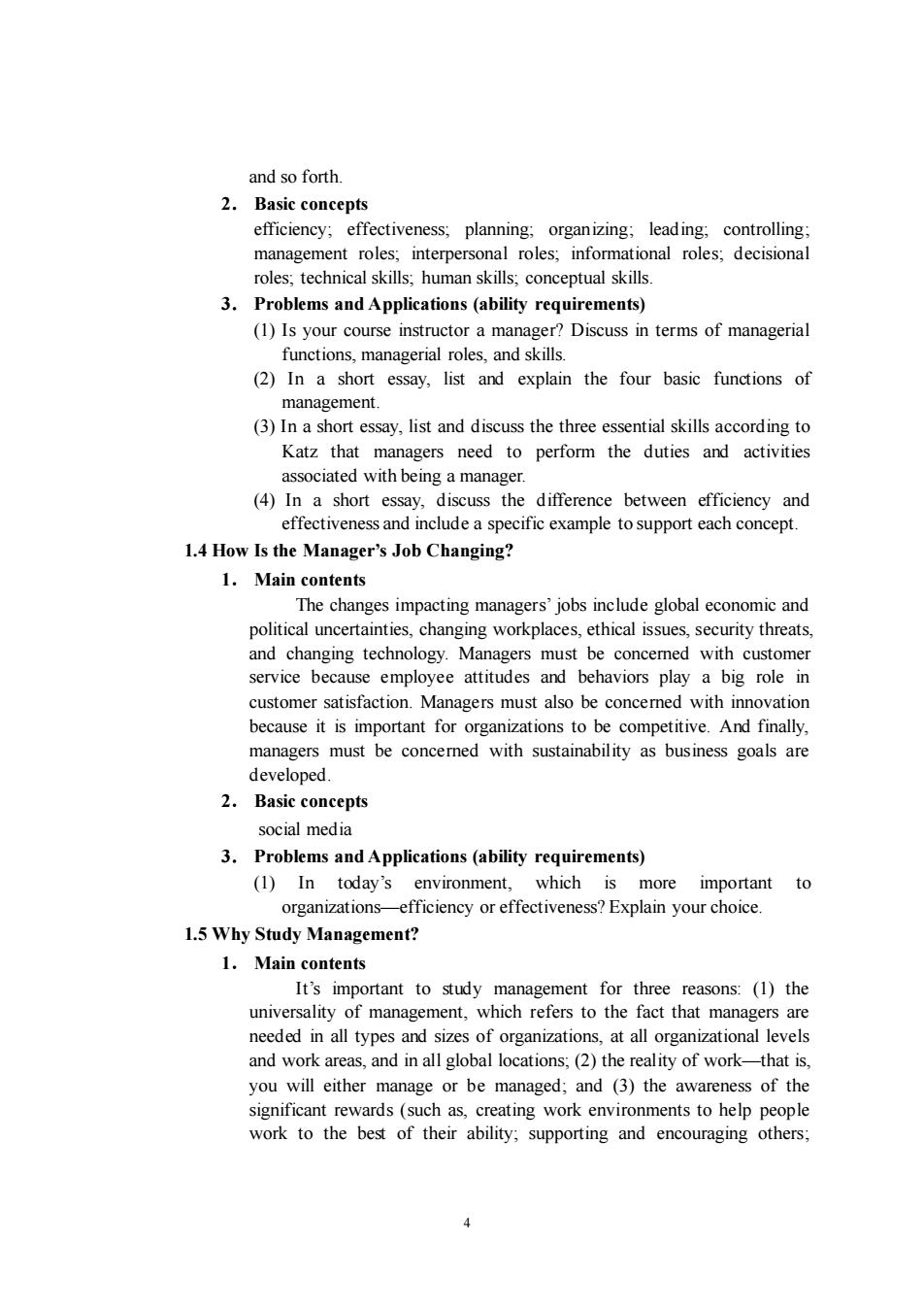
and so forth. 2.Basic concepts efficiency:effectiveness,planning:organizing:leading:controlling management roles,interpersonal roles:informational roles:decisional roles;technical skills;human skills,conceptual skills. 3.Problems and Applications(ability requirements) (1)Is your course instructor a manager?Discuss in terms of managerial functions.managerial roles.and skills. (2)In a short essay,list and explain the four basic functions of management. (3)In a short essay,list and discuss the three essential skills according to Katz that managers need to perform the duties and activities associated with being a manager. (4)In a short essay,discuss the difference between efficiency and effectiveness and include a specific example to support each concept. 1.4 How Is the Manager's Job Changing? 1.Main contents The change es imp cting and political uncertainties,changing workplaces,ethical issues security threats and changing technology.Managers must be concered with customer service because employee attitudes and behaviors play a big role in customer satisfaction.Managers must also be concerned with innovation because it is imp ortant for deepa"mueeone nizations to be competitive.And finally managers with sustainability as business goals are 2.Basic concepts social media 3.Problems and Applications(ability requirements) ))In today environment. which is ore important to organizations efficiency or effectiveness?Explain your choice. 1.5 Why Study Management? 1.Main contents It's important to study management for three reasons:(1)the universality of management,which refers to the fact that managers are needed in all types and sizes of organizations,at all organizational levels and w rk ar as,and in all global locations,(2)the reality of work-that is you will either manage or be managed;and (3)the awareness of the significant rewards(such as,creating work environments to help people work to the best of their ability;supporting and encouraging others; 4
4 and so forth. 2. Basic concepts efficiency; effectiveness; planning; organizing; leading; controlling; management roles; interpersonal roles; informational roles; decisional roles; technical skills; human skills; conceptual skills. 3. Problems and Applications (ability requirements) (1) Is your course instructor a manager? Discuss in terms of managerial functions, managerial roles, and skills. (2) In a short essay, list and explain the four basic functions of management. (3) In a short essay, list and discuss the three essential skills according to Katz that managers need to perform the duties and activities associated with being a manager. (4) In a short essay, discuss the difference between efficiency and effectiveness and include a specific example to support each concept. 1.4 How Is the Manager’s Job Changing? 1. Main contents The changes impacting managers’ jobs include global economic and political uncertainties, changing workplaces, ethical issues, security threats, and changing technology. Managers must be concerned with customer service because employee attitudes and behaviors play a big role in customer satisfaction. Managers must also be concerned with innovation because it is important for organizations to be competitive. And finally, managers must be concerned with sustainability as business goals are developed. 2. Basic concepts social media 3. Problems and Applications (ability requirements) (1) In today’s environment, which is more important to organizations—efficiency or effectiveness? Explain your choice. 1.5 Why Study Management? 1. Main contents It’s important to study management for three reasons: (1) the universality of management, which refers to the fact that managers are needed in all types and sizes of organizations, at all organizational levels and work areas, and in all global locations; (2) the reality of work—that is, you will either manage or be managed; and (3) the awareness of the significant rewards (such as, creating work environments to help people work to the best of their ability; supporting and encouraging others;
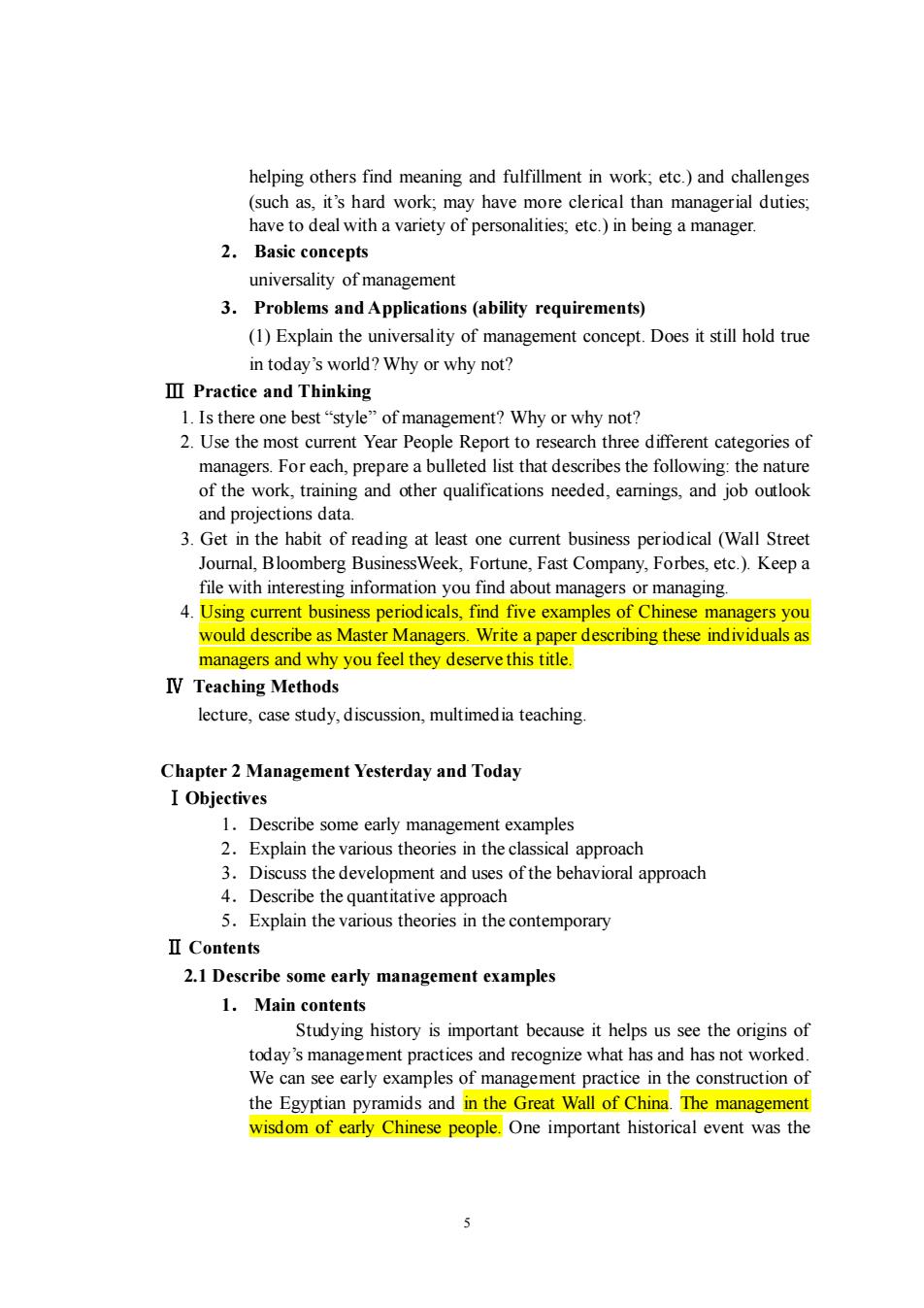
helping others find meaning and fulfillment in work;etc.)and challenges (such as,it's hard work;may have more clerical than managerial duties; have to deal with a variety of personalities.etc.)in being a mar 2.Basic concepts universality of management 3.Problems and Applications(ability requirements) (1)Explain the universality of management concept.Does it still hold true in today's world?Why or why not? II Practice and Thinking 1.Is there one best"style"of management?Why or why not? 2.Use the most current Year People Report to research three different categories of managers.For each,prepare a bulleted list that describes the following:the nature of the work,training and other qualifications needed,eamings,and job outlook and projections data 3.Get in the habit of reading at least one current business periodical(Wall Street Journal,Bloomberg BusinessWeek.Fortune.Fast Company.Forbes.etc.)Keep a file with interesting information you find about managers or managing. 4.Using current business periodicals,find five examples of Chinese managers you ould esribes Master Managers.Writea paperribngheindividualsas managers and why you feel they deservethis title. IV Teaching Methods lecture,case study,discussion,multimedia teaching Chapter 2 Management Yesterday and Today I Objectives 1.Describe some early management examples 2 E xplain the us theories in the clas approach Discuss the development and uses of the behavioral approach 4.Describe the quantitative approach 5.Explain the various theories in the contemporary ⅡContents 2.1 Describe some early management examples 1. Main contents Studving history is important because it helps us see the origins of today's management practices and recognize what has and has not worked. We can see early examples of management practice in the construction of orchinese peop的nerrcth低 n pyran mids and in the eaWall of China.The managem 5
5 helping others find meaning and fulfillment in work; etc.) and challenges (such as, it’s hard work; may have more clerical than managerial duties; have to deal with a variety of personalities; etc.) in being a manager. 2. Basic concepts universality of management 3. Problems and Applications (ability requirements) (1) Explain the universality of management concept. Does it still hold true in today’s world? Why or why not? Ⅲ Practice and Thinking 1. Is there one best “style” of management? Why or why not? 2. Use the most current Year People Report to research three different categories of managers. For each, prepare a bulleted list that describes the following: the nature of the work, training and other qualifications needed, earnings, and job outlook and projections data. 3. Get in the habit of reading at least one current business periodical (Wall Street Journal, Bloomberg BusinessWeek, Fortune, Fast Company, Forbes, etc.). Keep a file with interesting information you find about managers or managing. 4. Using current business periodicals, find five examples of Chinese managers you would describe as Master Managers. Write a paper describing these individuals as managers and why you feel they deserve this title. Ⅳ Teaching Methods lecture, case study, discussion, multimedia teaching. Chapter 2 Management Yesterday and Today ⅠObjectives 1.Describe some early management examples 2.Explain the various theories in the classical approach 3.Discuss the development and uses of the behavioral approach 4.Describe the quantitative approach 5.Explain the various theories in the contemporary Ⅱ Contents 2.1 Describe some early management examples 1. Main contents Studying history is important because it helps us see the origins of today’s management practices and recognize what has and has not worked. We can see early examples of management practice in the construction of the Egyptian pyramids and in the Great Wall of China. The management wisdom of early Chinese people. One important historical event was the